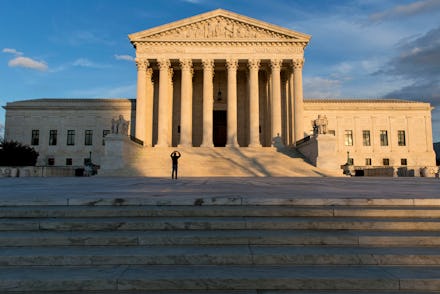What to know about the Louisiana abortion law the Supreme Court will rule on next year

On Friday, the Supreme Court announced it will take on another abortion-related case, this time out of Louisiana. The case, June Medical Services vs. Gee, is a referendum on abortion access based on a Louisiana state law called Act 620, which requires all doctors in the state to have admitting privileges at hospitals within a 30-mile radius of the clinic at which they practice. It's a mandate that was already struck down by the Supreme Court in 2016 and challenges nearly 50 years of legal precedent regarding the right to safe abortion.
On a press call, Nancy Northup, the president and CEO of the Center for Reproductive Rights, said that Louisiana lawmakers pushing Act 620 are trying to “sneak around the Constitution” in their effort to limit access to abortion in any way they can. While the case has immensely high stakes — this is the first time an abortion case has been brought to the Supreme Court since the appointment of conservative justices Neil Gorsuch and Brett Kavanaugh — recent case precedent suggests that Act 620 will not be successful.
In 2016, the Supreme Court heard an identical case out of Texas, called Whole Woman’s Health v. Hellerstedt; Texas law had mandated the same admitting privileges for doctors as Act 620 does in Louisiana. The court struck down the law in 2016 in a 5-3 decision, with Justice Stephen Breyer writing in the majority opinion that "the admitting-privileges requirement, provides few, if any, health benefits for women, poses a substantial obstacle to women seeking abortions, and constitutes an 'undue burden' on their constitutional right to do so.”
Act 620, which Louisiana passed in 2014, “is the identical law that the state of Texas had passed the year before,” Julie Rikelman, the senior litigation director at the Center for Reproductive Rights, told Mic. “By the time the Louisiana law had passed, the Texas admitting privileges law had gone into effect, and it had closed down half the clinics in the state of Texas. The Louisiana legislature was made aware, by anti-choice activists, that this identical law in Texas had in their words ‘tremendous success in closing down clinics.’”
Rikelman explains that the Center for Reproductive Rights filed a lawsuit against Act 620 immediately after it was passed, stopping the law from going into effect. It’s instead been tied up in legal proceedings, making its way all the way up to the Supreme Court, where oral arguments will likely be presented early 2020.
In the end, though, it’s not really about admitting privileges. Abortions are exceedingly safe as a medical procedure; per the American College of Obstetricians and Gynecologists, complications arise for 1 in 1,000 patients undergoing second-trimester abortions. First-trimester procedures are even safer.
Instead, it’s about limiting abortion access overall: Requiring admitting privileges for doctors who perform abortions would shut down most clinics in these states — which have few to begin with — and thus make it virtually impossible for people seeking abortion services to be able to access them.
That’s what makes June Medical different from a direct challenge to Roe vs. Wade. The case itself doesn’t seek to ban abortion nationwide but rather seeks to dramatically limit patients’ access to the procedure.
“There would be really devastating harm to access in Louisiana,” Rikelman says. “But right now the law remains blocked. It won’t be decided on [by the Supreme Court] until June 2020. We believe the law will continue to be blocked because it is a straightforward case, and the court will say they meant it the first time [in ruling such requirements unconstitutional] in the Texas case.”
But the court that decided to overturn the Texas law included Justice Anthony Kennedy, who had acted as a crucial swing vote in siding with liberals on seminal social justice cases, including same-sex marriage. Kennedy retired in 2018, and it remains to be seen whether the decidedly more conservative 2019 bench will rule the same way.
In Louisana, the number of abortion clinics went from seven in 2010 to three in 2019. If Act 620 were to win in the Supreme Court, there would only be one clinic left open — to serve the 1 million people of reproductive age who live in the state. The cost and time it would take to travel to that clinic would effectively make abortion banned for many people in the state, especially those with low incomes. “Access to abortion will be nearly eliminated,” Rikelman says.
For Louisiana providers, the battle over Act 620 is as personal as it is professional. Kathaleen Pittman is the clinic director at Hope Medical Group, which is one of the three Louisiana clinics remaining. Hope Medical has remained open through state litigation and will remain open throughout Supreme Court litigation too, but if Act 620 is allowed to take effect it will mean the end of the clinic. The law is “medically unnecessary,” Pittman emphasized, adding that she’s frustrated that the right to an abortion is still under threat.
"It is critical that the court says that this law is unconstitutional and follows the precedent set from three years ago [in Whole Woman’s Health],” Rikelman says. “Otherwise, people’s actual ability to access abortion will be in grave jeopardy.”